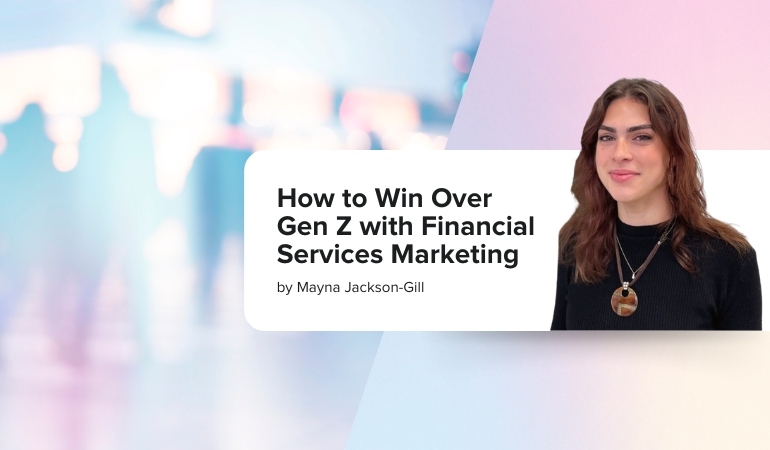As a digital marketer working for the financial services sector, understanding your customers is the foundation to success. And if you are not yet paying attention to Gen Z, it’s time to start.
As a proud (and maybe slightly biased) member of Gen Z, our financial habits and tech-driven lives are redefining how businesses need to engage with us.
In this article, I’ll explore the top financial behaviours and habits for Gen Z, and why it’s essential for businesses to catch on now.
Why is Gen Z important?
Simply put, we’re the next generation of consumers and decision-makers. Already, Gen Z accounts for roughly ¼ of the global population, and is expected to make up 30% of the workforce by 2030.
Growing up in a digital world, personalised experiences and instant access have become second-nature to us.
How to Market to Generation Z
All-Digital
We were born with technology; we don’t know a life without it. The world of digital is endless in reach in a way that you can get almost anything, from anywhere, at any time.
Solution: now-a-days, relying on traditional marketing strategies, such as physical prints and radio slots, won’t get you far. With 83% of organisations selling through digital channels, and approximately 30% of UK businesses operating exclusively online, it is vital to have a strong digital presence. To target Gen Z directly, give short-form video content a go!
Approaching with caution
With improved financial education and continuous learning from previous generations, Gen Z approaches topics such as debt and planning for financial futures with caution.
Additionally, the current economic pressures and rising living costs have made us more selective and cautious with spending. We seek value in our purchases, particularly in areas aligned with our social, environmental and personal values.
Solution: Authenticity and full transparency will win Gen Z over, as it allows businesses to build relationships through trust and loyalty. We believe that when we buy from a brand, we’re really choosing the people and values behind it.
Personalised Experiences
Gen Z seems more curious and optimistic when it comes to AI, compared to older generations who are more skeptical about AI and personalisation, perceiving it as intrusive. According to a 2023 KPMG global study on AI and trust, Baby Boomers reported an ‘AI acceptance rate’ of 22%, compared to 40% among Gen Z. While these figures highlight generational differences, it's likely that attitudes have shifted since the study, as advancements in AI continue to reshape perceptions and applications at speed.
Solution: Integrate AI into your marketing campaigns to deliver personalised, relevant and timely content. For example, use AI tools to analyse and interpret data and identify trends which can then be used to create targeted campaigns. Additionally, integrate AI into communication systems- such as emails and on social media posts- to tailor messages to improve engagement rates.
Experiential Marketing Strategies
Experiential marketing focuses on creating immersive, memorable experiences that resonate emotionally with customers. A standout example from 2024 is Monzo’s partnership with Greggs, where they launched the first sausage-roll dispensing ATM, called the ‘ATMmm’, where people who passed by could grab a free Sausage Roll or Vegan Sausage Roll. The campaign also targeted Monzo Perks and Max subscribers, who enjoy weekly Greggs treats as part of their benefits, making it a fun and engaging experience for both brands’ audiences.
Solution: Design innovative, interactive experiences that highlight your financial products while making them approachable and engaging.
Think virtual events that mix education with entertainment, tools that turn financial planning into a fun challenge, or immersive virtual tours that showcase your offerings in action. These approaches build trust and loyalty, especially with Gen Z, who value authentic connections.
From Influencers to Insiders: The Rise of Employee Advocates
During 2024, employees increasingly stepped-up to the role of influencers, a trend driven by the desire for authenticity. This is often referred to as EGC (Employee-Generated Content), where unlike traditional influencers, employees offer a more relatable and credible perspective, providing insights that resonate with audiences and build trust.
Solution: Encourage employees to be active on social media platforms like LinkedIn and support them in building their personal brand. Provide guidance, resources, and training to help them confidently share authentic insights and experiences that align with your company’s values.
Conclusion
Businesses that successfully engage with Gen Z today are not just capturing a growing market- they're securing their place in the future.
By building authenticity and earning the loyalty of this influential generation, companies can drive sustainable growth and remain relevant in an ever-changing industry.





